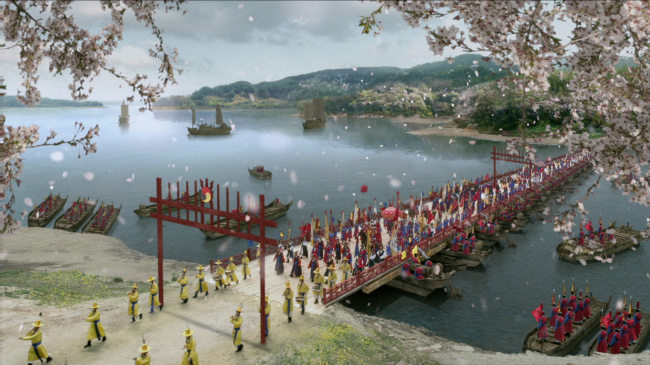3-D film reconstructs 18th-century Joseon fest
‘Uigwe, the 8-Day Festival’ offers resonating character study of King Jeongjo
By Claire LeePublished : April 15, 2014 - 20:38
It took Crown Prince Sado (1735-1762) eight days to die of starvation after his father King Yeongjo ordered him to be confined in a cramped wooden rice chest.
Sado’s son, who later became King Jeongjo, was only 10 when his father was killed by his grandfather. Exactly 33 years after Sado’s death, Jeongjo threw a grandiose festival in 1795, which lasted for eight days ― the same number of days his father spent alone locked in the wooden box.
KBS Media’s latest 3-D documentary, “Uigwe, the 8-Day Festival,” brings the event to the big screen. The film is based on “Wonhaengeulmyojeongriuigwe,” an 8-volume set of royal documents that recorded the event with both text and hand-drawn illustrations. This set was among the 300 or so volumes of “Uigwe” looted by French troops some 150 years ago and returned to Korea in 2011. “Uigwe,” the Joseon Era’s royal books, recorded significant rites and ceremonies of the royal family of Joseon, including weddings, banquets and the results of foreign missions.
Sado’s son, who later became King Jeongjo, was only 10 when his father was killed by his grandfather. Exactly 33 years after Sado’s death, Jeongjo threw a grandiose festival in 1795, which lasted for eight days ― the same number of days his father spent alone locked in the wooden box.
KBS Media’s latest 3-D documentary, “Uigwe, the 8-Day Festival,” brings the event to the big screen. The film is based on “Wonhaengeulmyojeongriuigwe,” an 8-volume set of royal documents that recorded the event with both text and hand-drawn illustrations. This set was among the 300 or so volumes of “Uigwe” looted by French troops some 150 years ago and returned to Korea in 2011. “Uigwe,” the Joseon Era’s royal books, recorded significant rites and ceremonies of the royal family of Joseon, including weddings, banquets and the results of foreign missions.

The documents recorded the eight-day event in detail, including hand-drawn illustrations of the costumes and even underwear worn by dancers, the meals royals ate, and the temporary bridge Jeongjo designed. He ordered a total of 36 boats to be connected to create a bridge across the Han River during his grand march to present-day Suwon, where his father was buried, from the palace in Seoul. Some 6,000 soldiers and followers, as well as 1,400 horses, were involved in the march.
The 3-D film does an impressive job of reconstructing what’s recorded in the ancient text, which was registered in UNESCO’s Memory of the World Program in 2007, on the big screen. Experts on Korea’s traditional clothing and cuisine and Joseon Era history, participated in the project. Among them were Han Bok-ryo, president of the Institute of Korean Royal Cuisine, and Kim Hye-soon, who has been doing extensive study on Korean traditional garments.
“It was more work for us because everything was recorded in such detail with illustrations,” said Choi Pil-gon, the director of the film. “We tried to stay true to the text and illustrations as much as we could.”
The film’s biggest achievement, however, is arguably its character study of King Jeongjo, who is regarded as one of the most successful rulers of the Joseon Era today. Using almost dreamy images of water ― it is recorded that it rained heavily the day Prince Sado died ― the film explores how the king’s childhood trauma affected his personality, as well as the way he governed his people. His achievements include a number of bold social reforms, including opening government positions to those not previously allowed to apply because of their social class.
The film argues that the eight-day festival was Jeongjo’s long-planned “revenge” upon those who led Prince Sado to death, that is, his and his late father’s political opponents. Growing up, Jeongjo was often stigmatized as the “son of the sinner” by those who accused Prince Sado of raping and killing people in the palace. During his first year as king, Jeongjo survived a total of seven assassination attempts.
The eight-day festival was to celebrate his mother Lady Hyegyeong’s 60th birthday. He took his mother and his followers to Suwon, where his late father was buried, and held her birthday party there. A session of military training, including a large-scale cannon firing demonstration at night, followed. His mother and late father were the same age, so if Prince Sado were still alive, he would’ve turned 60 that year as well.
According to the film, the eight-day festival was Jeongjo’s way of showing his military and political power, as well as his long-awaited homage to his father. The movie offers a resonating interpretation of his political choices as a king, including why it was important for the former “son of the sinner” to give equal opportunities for those who could not work for the government because of their social status, most of whom were children of noblemen’s concubines.
Though subjective at times, the film succeeds in creating a moving, nuanced portrait of one of the most famous kings of the Joseon Era, including his trauma, his dreams and his “han” ― the feeling of unresolved resentment against injustices suffered ― and how he dealt with it as a ruler and as a son.
“Uigwe, the 8-Day Festival” opens only in CGV’s 3-D theaters nationwide. For information, visit www.facebook.com/cjcgv.
By Claire Lee (dyc@heraldcorp.com)



![[Exclusive] Korean military set to ban iPhones over 'security' concerns](http://res.heraldm.com/phpwas/restmb_idxmake.php?idx=644&simg=/content/image/2024/04/23/20240423050599_0.jpg&u=20240423183955)
![[AtoZ into Korean mind] Humor in Korea: Navigating the line between what's funny and not](http://res.heraldm.com/phpwas/restmb_idxmake.php?idx=644&simg=/content/image/2024/04/22/20240422050642_0.jpg&u=)



![[Graphic News] 77% of young Koreans still financially dependent](http://res.heraldm.com/phpwas/restmb_idxmake.php?idx=644&simg=/content/image/2024/04/22/20240422050762_0.gif&u=)

![[Herald Interview] Why Toss invited hackers to penetrate its system](http://res.heraldm.com/phpwas/restmb_idxmake.php?idx=644&simg=/content/image/2024/04/22/20240422050569_0.jpg&u=20240422150649)




![[Exclusive] Korean military to ban iPhones over security issues](http://res.heraldm.com/phpwas/restmb_idxmake.php?idx=652&simg=/content/image/2024/04/23/20240423050599_0.jpg&u=20240423183955)



![[Today’s K-pop] Ateez confirms US tour details](http://res.heraldm.com/phpwas/restmb_idxmake.php?idx=642&simg=/content/image/2024/04/23/20240423050700_0.jpg&u=)